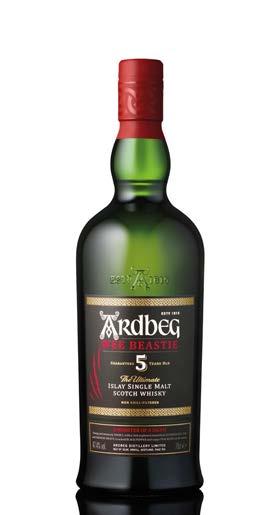
3 minute read
Old versus new
Have modern techniques changed the flavour of whisky, and what is a craft distiller anyway?
Words by JOHN LAMOND
ABOVE: The new Macallan distillery near Craigellachie in Moray RIGHT: Ardbeg Wee Beastie 5 Years Old In Scotland, the terms ‘craft’ and ‘artisan’ suggest authenticity, and consumers of alcoholic liquids pay good money for drinks labelled such. The words suggest the spirit is hand-made, a small production, and probably uses old-school distilling techniques.
However, some of the world’s biggest companies are active in the craft distilling sector. Macallan, for example, can be considered a craft distiller even though its new distillery, which opened in 2018, produces 10 million litres of alcohol each year, in excess of 33 million bottles annually.
You could also justifiably argue that Springbank in Campbeltown is a ‘craft distillery’, as its annual output is only 750,000 litres or 2.5 million bottles. So, the question we have to ask ourselves is: what do the terms ‘craft’ or ‘artisan’ distillery really mean?
Modern technology has allowed distilleries to become more efficient. There is a body of people out there who argue that these recent technological breakthroughs have removed flavours and lessened quality. They would suggest that by comparing bottlings from the 1960s with their present alternatives, you are able to taste what the modern-day whiskies have lost.
Roderick Kemp, who owned Macallan in the 19th century, refused to make any changes to the process in case it changed the character of the whisky and that included the removal of spiders’ webs in the stillhouse. He sounds like a man after my own heart – I am not very good at housework either.
In recent years, we have seen Glen Grant return to directfired stills and Benriach re-installing their floor maltings, something that Kilchoman on Islay has done and nearby Bruichladdich is in the process of completing.
Glen Garioch has recently announced that it is going to spend £6 million returning production to direct-fired stills and a maltings floor. These hands-on procedures are most definitely old school. But do they mean ‘craft’, and do they improve the whisky?
Three of the things that have changed in the past 60 years are that the grains of the barley are larger than they were, the maltsters have moved from using peat as a primary fuel in malt kilns to secondary smoke generators, and distillers no longer use longer, cooler fermentations.
Yes, these changes have been done for efficiency and economy, but they have also been done to appeal to consumers’ tastes: by lightening the spirit, modern whiskies are more appealing to a larger market. Of course, as these new consumers have been experimenting, they are now demanding heavier spirits again.
Ultimately, it is the talent and ability of the staff at the distilleries that determines the quality of the spirit. S

A Master of Malt, John Lamond is one of the world’s leading authorities on whisky and author of The Malt Whisky File, The Whisky Connoisseur’s Companion and Le Snob: Whisky.
TASTING NOTES
■ The first whisky of this issue is Aberfeldy 16 Years Old. This is rich and quite full-bodied with aromas of rhubarb crumble, honey and white chocolate; with water the nose opens with some sooty smoke, toffee apple and a little pepper. The flavour is medium-dry, quite fresh and clean with some notes of cinnamon, butterscotch and smoky apples, finishing long, quite ethereal with some old leather and gentle spice. Price: £55 (US$107). dewars.com
■ Ardbeg has released a youthful 5-year-old whisky: Ardbeg Wee Beastie. It is quite big-bodied with notes of a smoky bonfire on the beach and a touch of citrus; with water, the smoke becomes sootier with a touch of toffee, some black pepper and stewed apples. The palate is big, powerful, medium-dry, youthful and rich with notes of charred oak, espresso coffee, smoked trout, some ginger spice and a touch of orange. It finishes long, tangy and quite unctuous with the spice lingering. Price: £39 (US$50). ardbeg.com
■ WoodWinters is a small chain of drink shops in Bridge of Allan, Edinburgh and Inverness. Its whisky selection is very eclectic, focusing on smaller independent bottlers and less widely available whiskies. The staff are knowledgeable and, pre-Covid, tastings were held in store. At the moment, Zoom tutorials are educating a much wider audience. woodwinters.com










